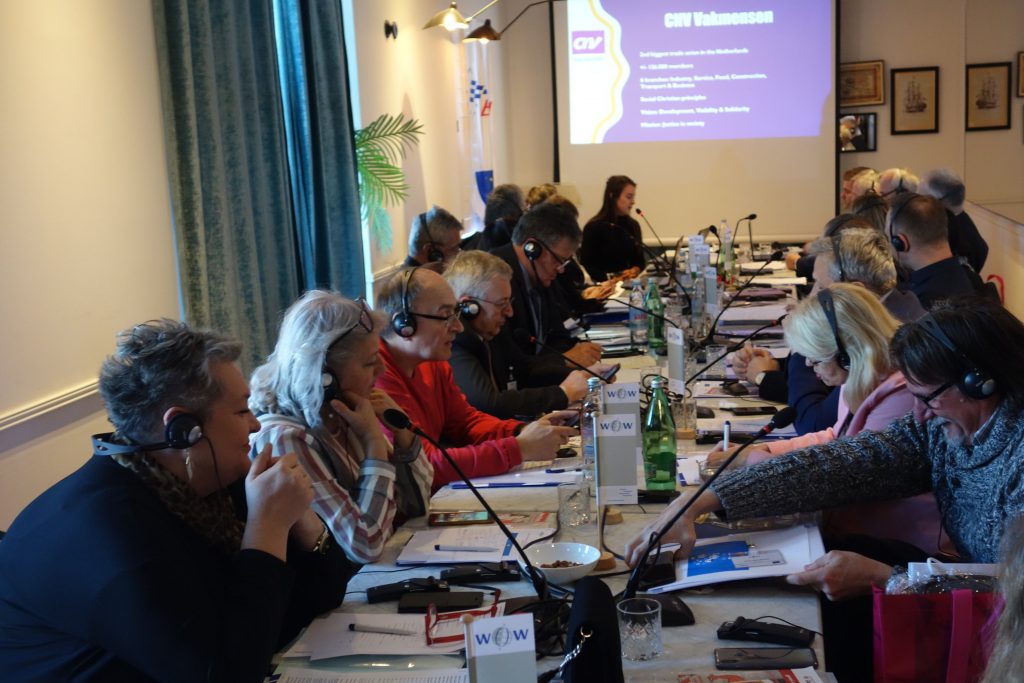What are the reasons for workers to organize themselves today? How do we reach them as a union? What could be done better? What tools do we need and have as trade unionists to keep people involved? These are key-questions for trade unions today. Trade unions are having difficulties to keep members and attract new ones. Why is this the case? Have trade unions lost their importance? Are trade unions considered old-fashioned? Or do they have difficulties to connect to (new type of) workers or to find appropriate answers to the current challenges?
During a two-day seminar in Trogir, Croatia, which took place from 26-28 February more than thirty trade unionists from 10 different countries discussed the current situation and possible future strategies to grow as a movement. Grow in number of members, in relevance, and level of influence. The seminar was organised by the World Organization of Workers (WOW) in cooperation with the European Centre for Workers’ Questions (EZA) and supported by the European Commission.
The seminar was opened by the president of the Croatian trade union Republi?ki sindikat radnika, Mr. Ivan Majdak. He stressed the importance of the topic, despite the fact that the trade union movement is well-developed in Croatia. Currently there are five trade union centres of which three are representative and negotiate CLA’s. In 2019 the trade unions initiated two actions. The first was about the pension-age. The government wanted to increase this to 67, but through a referendum whereby 650.000 signatures were collected the government decided to cancel this. The second action was a teachers’ strike which lasted for a month. Eventually the teachers got an wage-increase of 6%. The two actions show the importance of trade unions.
In his contribution ‘Trade unions at a turning point’ Mr. Davorko Vidovic, Advisor for work policy and employment Croatian Chamber of Economy gave a historical overview of the relation employer and employee in Croatia and the region. While the paradigm has changed it can still be observed that the old relationship is still dominant. A number or reasons often mentioned why membership is falling are neoliberalism; deindustrialization; the fact that corporate management is taking over the role of unions; that trade unions are not flexible and attractive enough to name just a few. In the case of Croatia people do not always believe that trade unions have the right ideology and that family and friends pressure people not to join. Trade unions should give answers to these questions. They should do this by being proactive and possibly cooperative (partner with other like-minded organizations; do not have to be unions necessarily). Mr. Vidovic was certain that trade unions will not disappear, because of their vertical integration (government and employers) as well as their horizontal integration (basis of workers). Trade unions are in the perfect position to search for solutions. This requires adopting clearly defined visions and objectives with a new type of leadership that is charismatic and aware of the problems of todays’ society.
Mr. Markus Hiesberger, Regional secretary GPA-djp in his presentation titled ‘Only together we are strong’ described the labour-market, the legal system, and how workers’ representation works in Austria. The GPA-djp negotiates approx. 180 collective agreements of a total of 500. These are usually valid for 12 months. And around 95% of employees in Austria is covered by a CLA. At company-level too there is representation on different levels. This very much for issues at the particular workplace. The system in Austria is such that workers are represented on different levels (national and company level).
In ‘New generation – finding and attracting young union members’ Ms. Chantal van Binsbergen and Mr. Frederick Pellis, Trade union consultants the Dutch CNV Vakmensen, presented the initiative ‘Try the union’. Through this program they offer free membership for students till the age of 23 years and juridical advise, salary checks, discount on health insurance, tax service. To get into touch with these young people they visit schools to explain what the trade union is doing. The principle problems found during these school visits were the lack of awareness about labour rights; the image of the trade union; anxiety (feelings of power imbalance); complexity; and lack of trust. While the main problems the millennials are facing are lack of awareness about labour rights; abuse by the employers of ignorance; abuse by the employers of labour rights with flexwork; internship payments, student debts, and burnouts.
Through the ‘Try the union’ program CNV Vakmensen attracted 8241 new members. 30% of the free members became a paid member after the age of 23. What is most important is appropriate communication directed to the new generations. For this trust is key. The presentation ended with a position being ‘The new generation doesn’t know what trade unions are or do. Is this a threat, or do we have to see this as an opportunity?’ It could work both ways!
Mr. Gerald Silbernagl, President White Collar Workers Works Council Mondi Neusiedler in Austria focused on the importance of being a trade union member. His contribution titled ‘Solidarity instead of lone fighters’ showed that, for example, despite the fact that in Austria it is not a necessity to be a member of a union when wanting to be a part of a Works Council, it is essential for promoting the union and to get all the advice and support. Mr. Silbernagl further elaborated on all the benefits of trade union membership.
The working groups, where the participants discussed reasons for becoming or not becoming a member, concluded the first day.
Day two of the seminar started with the presentation of Mr. Hrvoje Butkovic, Senior Research Associate, Department for European Integration, Institute for Development and International Relations. He discussed the ‘Trade union movement in Croatia: Current situation and development perspectives’. In Croatia there are only two sectoral agreements (construction; catering and tourism). For the largest part the agreements are on company-level.
Mr. Butkovic stated that the main reason for young people in Croatia (and the region) not to join a union is the fact that they are in a precarious position. They do not want to ‘upset’ their employers. This is problematic. What can be seen in Croatia (as elsewhere) is that many of the young people are working with non-standard contracts. Making them very vulnerable.
What is necessary in Croatia is to draw up a new labour law where new ways of working are recognized. This has not happened so far. In addition trade unions should focus more on non-standard workers. Together with more visibility this would be really beneficial for the trade union movement. Trade unions should focus less on direct democracy.
The last part of the seminar was a workshop whereby the participants were asked to develop a campaign with the motto «I am smart and therefore a union member». The main results were that trust is key. This is different per country. Furthermore, (young) people should be informed more about what a trade union is and does. Unions should make themselves more visible. Visiting schools is a good way of becoming more visible. Another proposal is to promote the union through coffee-karts. Also, a Membership-to-Go (for six months) would be a good way to attract new members.
The general perception of all who attended is that there are chances for unions, but this demands effort and change. Positive was that all present felt that trade unions have the future and will continue to have an important role to play on the labour-market and in society as a whole.
for pictures click here





